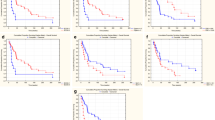Abstract
Background
The objective of this study was to identify predictive markers, including inflammatory and nutritional status measures, of early progressive disease (EPD) in unresectable melanoma patients treated with nivolumab.
Methods
A retrospective review was performed on 39 consecutive patients with unresectable melanoma treated with nivolumab. EPD was defined as progressive disease within 60 days after starting nivolumab according to Response Evaluation Criteria in Solid Tumors version 1.1. The predictive index model [melanoma inflammation index (MII)] was determined by the number of predictive factors.
Results
Seventeen patients had cutaneous melanoma and 22 patients had mucosal melanoma. The overall response rate was 18.4%, and the response rates for cutaneous and mucosal melanoma were 29.4% and 9.5%, respectively. EPD was observed in 13 patients (34.2%). By multivariate analysis, body mass index (BMI) and C-reactive protein to albumin ratio (CAR) were independently and significantly associated with EPD, disease control rate, progression-free survival, and overall survival. Low BMI (cutoff 20) and high CAR (cutoff 0.0055) were predictive factors of EPD and were determined to be prognostic factors. MII, from 0 to 2, was determined by the number of these factors. The incidence of EPD was 0% in the low-risk group (MII = 0), 50% in the intermediate-risk group (MII = 1), and 83% in the high-risk group (MII = 2).
Conclusions
An MII status of low BMI and high CAR may be used to predict EPD in unresectable melanoma patients treated with nivolumab.
Similar content being viewed by others
References
Hodi FS, O’Day SJ, McDermott DF et al (2010) Improved survival with ipilimumab in patients with metastatic melanoma. N Engl J Med 363:711–723
Robert C, Karaszewska B, Schachter J et al (2015) Improved overall survival in melanoma with combined dabrafenib and trametinib. N Engl J Med 372:30–39
Chapman PB, Hauschild A, Robert C et al (2011) Improved survival with vemurafenib in melanoma with BRAF V600E mutation. N Engl J Med 364:2507–2516
Long GV, Stroyakovskiy D, Gogas H et al (2014) Combined BRAF and MEK inhibition versus BRAF inhibition alone in melanoma. N Engl J Med 371:1877–1888
Weber JS, D’Angelo SP, Minor D et al (2015) Nivolumab versus chemotherapy in patients with advanced melanoma who progressed after anti-CTLA-4 treatment (CheckMate 037): a randomised, controlled, open-label, phase 3 trial. Lancet Oncol 16:375–384
Larkin J, Chiarion-Sileni V, Gonzalez R et al (2015) Combined nivolumab and ipilimumab or monotherapy in untreated melanoma. N Engl J Med 373:23–34
Wolchok JD, Chiarion-Sileni V, Gonzalez R et al (2017) Overall survival with combined nivolumab and ipilimumab in advanced melanoma. N Engl J Med 377:1345–1356
Hang J, Xue P, Yang H et al (2017) Pretreatment C-reactive protein to albumin ratio for predicting overall survival in advanced pancreatic cancer patients. Sci Rep 7:2993
Kanda M, Fujii T, Kodera Y et al (2011) Nutritional predictors of postoperative outcome in pancreatic cancer. Br J Surg 98:268–274
Zaragoza J, Caille A, Beneton N et al (2016) High neutrophil to lymphocyte ratio measured before starting ipilimumab treatment is associated with reduced overall survival in patients with melanoma. Br J Dermatol 174:146–151
Bong TSH, Tan GHC, Chia C et al (2017) Preoperative platelet-lymphocyte ratio is an independent prognostic marker and superior to carcinoembryonic antigen in colorectal peritoneal carcinomatosis patients undergoing cytoreductive surgery and hyperthermic intraperitoneal chemotherapy. Int J Clin Oncol 22:511–518
Takahari D, Boku N, Mizusawa J et al (2014) Determination of prognostic factors in Japanese patients with advanced gastric cancer using the data from a randomized controlled trial, Japan clinical oncology group 9912. Oncologist 19:358–366
Shiroyama T, Suzuki H, Tamiya M et al (2018) Pretreatment advanced lung cancer inflammation index (ALI) for predicting early progression in nivolumab-treated patients with advanced non-small cell lung cancer. Cancer Med 7:13–20
McQuade JL, Daniel CR, Hess KR et al (2018) Association of body-mass index and outcomes in patients with metastatic melanoma treated with targeted therapy, immunotherapy, or chemotherapy: a retrospective, multicohort analysis. Lancet Oncol 19:310–322
Eisenhauer EA, Therasse P, Bogaerts J et al (2009) New response evaluation criteria in solid tumours: revised RECIST guideline (version 1.1). Eur J Cancer 45:228–247
Fang S, Wang Y, Dang Y et al (2017) Association between body mass index, C-reactive protein levels, and melanoma patient outcomes. J Invest Dermatol 137:1792–1795
Deichmann M, Kahle B, Moser K et al (2004) Diagnosing melanoma patients entering American Joint Committee on Cancer stage IV, C-reactive protein in serum is superior to lactate dehydrogenase. Br J Cancer 91:699–702
Findeisen P, Zapatka M, Peccerella T et al (2009) Serum amyloid A as a prognostic marker in melanoma identified by proteomic profiling. J Clin Oncol 27:2199–2208
Tartour E, Blay JY, Dorval T et al (1996) Predictors of clinical response to interleukin-2–based immunotherapy in melanoma patients: a French multiinstitutional study. J Clin Oncol 14:1697–1703
Sirott MN, Bajorin DF, Wong GY et al (1993) Prognostic factors in patients with metastatic malignant melanoma. A multivariate analysis. Cancer 72:3091–3098
Snyder A, Makarov V, Merghoub T et al (2014) Genetic basis for clinical response to CTLA-4 blockade in melanoma. N Engl J Med 371:2189–2199
Steuer CE, Ramalingam SS (2018) Tumor mutation burden: leading immunotherapy to the era of precision medicine? J Clin Oncol 36:631–632
Le DT, Uram JN, Wang H et al (2015) PD-1 blockade in tumors with mismatch-repair deficiency. N Engl J Med 372:2509–2520
Funding
None of the authors have financial disclosures or funding support.
Author information
Authors and Affiliations
Corresponding author
Ethics declarations
Ethical approval
All procedures performed in studies involving human participants were in accordance with the ethical standards of the institutional and/or national research committee and with the 1964 Helsinki declaration and its later amendments or comparable ethical standards.
Conflict of interest
None of the authors have conflicts of interest to declare.
Informed consent
Informed consent was obtained from all individual participants included in the study.
About this article
Cite this article
Kondo, T., Nomura, M., Otsuka, A. et al. Predicting marker for early progression in unresectable melanoma treated with nivolumab. Int J Clin Oncol 24, 323–327 (2019). https://doi.org/10.1007/s10147-018-1345-9
Received:
Accepted:
Published:
Issue Date:
DOI: https://doi.org/10.1007/s10147-018-1345-9




